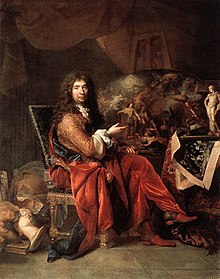Charles Le Brun
| Charles Le Brun | |
|---|---|

Charles Le Brun, portrait by Nicolas de Largilliere
|
|
| Born |
February 24, 1619 Paris |
| Died | February 22, 1690 (aged 70) Paris |
Charles Le Brun (24 February 1619 – 22 February 1690) was a French painter and art theorist. Declared by Louis XIV "the greatest French artist of all time", he was a dominant figure in 17th-century French art and much influenced by Nicolas Poussin.
Born in Paris, he attracted the notice of Chancellor Séguier, who placed him at the age of eleven in the studio of Simon Vouet. He was also a pupil of François Perrier. At fifteen he received commissions from Cardinal Richelieu, in the execution of which he displayed an ability which obtained the generous commendations of Nicolas Poussin, in whose company Le Brun started for Rome in 1642.
In Rome he remained four years in the receipt of a pension due to the liberality of the chancellor. There he worked under Poussin, adapting the latter's theories of art.
On his return to Paris in 1646, Le Brun found numerous patrons, of whom Superintendent Fouquet was the most important, for whom he painted a large portrait of Anne of Austria. Employed at Vaux-le-Vicomte, Le Brun ingratiated himself with Mazarin, then secretly pitting Colbert against Fouquet. Colbert also promptly recognized Le Brun's powers of organization, and attached him to his interests. Together they took control of the Academy of Painting and Sculpture (Académie royale de peinture et de sculpture, 1648), and the Academy of France at Rome (1666), and gave a new development to the industrial arts.
Another project Le Brun worked on was Hôtel Lambert. The ceiling in the gallery of Hercules was painted by him. Le Brun started work on the project in 1650, shortly after his return from Italy. The decoration continued intermittently over twelve years or so, as it was interrupted by the renovation of Vaux le Vicomte.
...
Wikipedia
